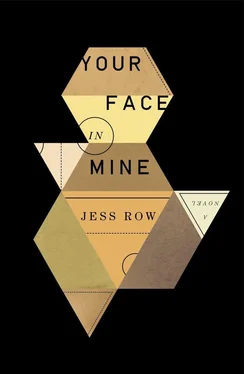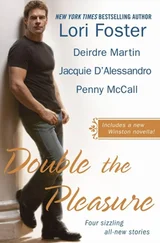For example?
For example, you aren’t dead, I said, though you probably should be, and if that isn’t a second chance, what is?
Would you do me a favor? he asked. Go in the bathroom. I have to take my diabetes shot. There’s a couple of new syringes in the cabinet. Get one out for me, would you? I’m feeling so dizzy I can hardly get up. And then maybe you can make me that soup you were talking about.
The syringes were on the top shelf inside the cabinet, still in their sterile packaging; they were bigger than the ones he usually used, which were no wider than pencils, and their labels, oddly, were printed in Chinese. Did it matter? Maybe adults used larger syringes. What was the other presumption: that he was back to shooting up? I was so angry, so shut out, and wounded, in the way that only nineteen-year-olds home from college can be wounded, that I thought, fuck him if he is. Live and let live.
Where’s the insulin? I called out to him. Doesn’t it come in a little bottle?
I have it here.
Alcohol pad?
Yeah. One of those, too. Man. All of a sudden I’m starving .
All right, I said, all right, dropping the syringe into his waiting hand, I’m going down, I’m on my way.
—
When I came back into the room I smelled something odd — something sweet, a burnt-sugar smell, out of place. And thought that I must have dropped something on the stove by accident. I left the soup with him and hurried down to check, and then came back, and he had taken a few sips of the soup and fallen asleep. He looked good. He looked happy. I say this not to excuse myself, but because it is merely, entirely, true: there was color returning to his cheeks, or at least that was what I saw. I pulled the blanket up around his chin. I didn’t wake him. I watched him for a minute, and then I left. He was only sleeping.
Recording #1 (41:32)
Source: TDK Chrome cassette tape, 90 minutes, condition ++
Labeled side one “Tape 1 PRIVATE DO NOT DESTROY”
Digitized to.flac with ProTools noise reduction
Note: Speaker frequently pauses for intervals of:10 or longer. To preserve consistency, all such intervals are marked in the text with a space break.
I was four years old before I ever met a black person. Can you believe that?
I remember it so clearly — my clearest childhood memory of all. I guess that’s not really surprising. She was sitting at the picnic table on the back patio, where we had meals in the summer. In a caftan, a bright orange-and-red print. She had an Afro. Lots of silver bangles on both arms. I imagine she must have been about thirty. I had no idea where she’d come from. It was the morning; she’d arrived overnight. I came out to ring the dinner bell — it was a big iron triangle, the kind they use on ranches — and I startled her, but then she looked over and saw me and smiled. She had been crying. There were tracks of tears on her cheeks. But when she saw me her mouth split into this enormous grin, the widest mouth, the friendliest mouth, I had ever seen in my life. A slice of the sun. She laughed, and she said, where did you come from? And I just wanted to run to her. Hell, maybe I still am running to her.
You know what the sex-change therapists say? Begin at the moment you knew. But in my case, it’s more complicated than that. Nature versus nurture: I’ve been playing that goddamned chess game my whole life. Out of context, or out of nowhere? Out of them, or out of me? By which I mean, of course, good old Mom and Dad. Or Dad, I should say, since she’s just a shadow, an afterthought. I was born, wasn’t I? Though sometimes it doesn’t feel that way. It seems almost like something to mention in parentheses. Oh, yeah, her.
Sometimes, sometimes I wish I didn’t remember her, but I do. Just barely. She was incredibly pale, with that light, light blond hair, eyebrows, everything, and the one image I have of her is in our kitchen, this enormous kitchen — it was the conservatory of the house before the commune converted it. She’s standing against the windows, her back to the windows, and it’s as if the sunlight is coming through her. I remember I was terrified of that. And fascinated. In any case, there’s my one memory, and then she was off. Untraceable, unidentifiable, or so my father claimed. I have no record of her whatsoever, not even a picture. I used to beg him to tell me whether I had her nose, or her ears, anything, and he would say, sorry, but as far as I can tell, you’re all me. More’s the pity. Well, it was the Seventies, wasn’t it? On a commune, in the Seventies? Nobody was keeping records.
Big Love. That’s what the place was called. It’s near Baltimore, actually. Edgewater. I went back there once, a few years ago, out of curiosity. The owners tore down the old house and built this gigantic Venetian palazzo. Circular driveway, tile mosaics, fountains, the whole thing. And a Maserati out front. But the barn was there: the barn I played in. That’s the only way I recognized it. The barn, and the trees, and these little hills looking out on the Severn.
Toward the end we were the only ones there at all. All I ever knew, in those days, was people leaving and never coming back. That black woman — know who that was? Shirley O’Dell. She was a backup singer for Ike and Tina, and later had a disco hit, “Give Me Someone to Love.” Her boyfriend, her ex-manager, had come out to Big Love and said he was never leaving. She showed up and they left the next day.
All those communes had the same trajectory — some of them just took longer to follow it all the way through. The guru, the big buildup, high times, donations, crowds, then the scandal, the blowup, people start to defect, the guru takes off, or dies, or whatever, then it dwindles down to the diehards, then the land gets sold for tract housing. Soon there’s nothing left but an old farmhouse, or a Home Depot, and a bunch of kids with names like Kali and Starflower Moonbright scattered around the county. But at least — and it’s a huge at least — there was no sex at Big Love. Or, I should say, at least, no sex I ever saw. At some of those places it was open season on the kids. Beneficent may have been downright crazy, but he was no Jim Jones. Should I give you the history, the whole rundown? Silpa wasn’t too interested. And maybe it’s tangential. But still, it’s culturally important. Beneficent Walker, the founder, that was his real name. Ex-Mormon, ex-seminarian, claimed he could speak fifteen languages, started the Church of Universal Holy Kindness. CUHK. He published a book, too, a bestseller: The God of Now. No one remembers it these days, but if you ever meet a boomer ex-hippie, chances are they’ll have it on an old dusty shelf somewhere, next to Ram Dass and the Tao Te Ching. That paid for Big Love, and kept the power and water on for a couple of years, but it wasn’t meant to last — he died the year I was born. Spinal cancer, claimed he could cure it through prayer, then changed his mind and decided God wanted him back. Of course, I never knew any of that until later; all I knew at the time was that there was with Beneficent, which was all happiness and harmony and light, and then there was after Beneficent, which was now. We had a shrine to him behind the house, in a Quonset hut, which was supposed to be temporary, until they raised the money to pay for marble. For a while it was Dad’s job to keep fresh flowers on the altar and keep the universal flame going. Which meant a new Sterno can every six hours on the dot, day or night. He had me doing it instead, toward the end. Popping off the lids with a screwdriver, flicking a rusty Bic lighter. Five years old.
Читать дальше












